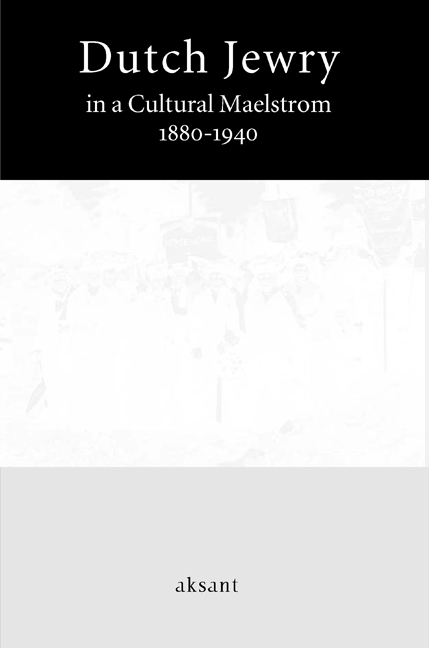Book contents
- Frontmatter
- Contents
- Foreword
- The New “Mosaik”: Jews and European Culture, 1750-1940
- The Politics of Jewish Historiography
- “The First Shall be the Last”: The Rise and Development of Modern Jewish Historiography in the Netherlands Until 1940
- Epigones and Identity: Jewish Scholarship in the Netherlands, 1850-1940
- Judaism on Display: The Origins of Amsterdam's Jewish Historical Museum
- De Vrijdagavond as a Mirror of Dutch Jewry in the Interbellum, 1924-1932
- “Holland is a Country which Provokes Serious Reflection…”: Images of Dutch Jewry in the German Jewish Press
- Spinozism and Dutch Jewry between 1880 and 1940
- Spinoza's Popularity in Perspective: A Dutch-German Comparison
- Mozes Salomon Polak: Jewish “Lerner” and Propagator of Freemasonry, Spiritualism, and Theosophy
- Jewish Women, Philanthropy, and Modernization: The Changing Roles of Jewish Women in Modern Europe, 1850-1939
- Roosje Vos, Sani Prijes, Alida de Jong, and the others: Jewish Women Workers and the Labor Movement as a Vehicle on the Road to Modernity
- Stemming the Current: Dutch Jewish Women and the First Feminist Movement
- Dutch Jewish Women: Integration and Modernity
- Index of Names of Persons
- Index of Subjects
“Holland is a Country which Provokes Serious Reflection…”: Images of Dutch Jewry in the German Jewish Press
Published online by Cambridge University Press: 26 January 2021
- Frontmatter
- Contents
- Foreword
- The New “Mosaik”: Jews and European Culture, 1750-1940
- The Politics of Jewish Historiography
- “The First Shall be the Last”: The Rise and Development of Modern Jewish Historiography in the Netherlands Until 1940
- Epigones and Identity: Jewish Scholarship in the Netherlands, 1850-1940
- Judaism on Display: The Origins of Amsterdam's Jewish Historical Museum
- De Vrijdagavond as a Mirror of Dutch Jewry in the Interbellum, 1924-1932
- “Holland is a Country which Provokes Serious Reflection…”: Images of Dutch Jewry in the German Jewish Press
- Spinozism and Dutch Jewry between 1880 and 1940
- Spinoza's Popularity in Perspective: A Dutch-German Comparison
- Mozes Salomon Polak: Jewish “Lerner” and Propagator of Freemasonry, Spiritualism, and Theosophy
- Jewish Women, Philanthropy, and Modernization: The Changing Roles of Jewish Women in Modern Europe, 1850-1939
- Roosje Vos, Sani Prijes, Alida de Jong, and the others: Jewish Women Workers and the Labor Movement as a Vehicle on the Road to Modernity
- Stemming the Current: Dutch Jewish Women and the First Feminist Movement
- Dutch Jewish Women: Integration and Modernity
- Index of Names of Persons
- Index of Subjects
Summary
Periodicals played an important role in the transition from the pre-modern to the bourgeois period, emerging as ideal discussion forums for the collective pursuit of the objective of a modern bourgeois identity. The nationwide press enabled the flourishing of a supra-regional and public debate, and as a result reinforced the distinctions between and the uniformity within political, social, and religious groups of the population. Modern liberalism, the labor movement, Protestantism, Catholicism, and various movements in Judaism all owe their specific shape to the formative discourses that took place in the contemporary press, and which helped establish their identities. Jews took part in this wide-ranging communicative process both passively, as readers, and actively, as writers and publishers of periodicals intended for Jewish readership of various nationalities.
GERMAN JEWISH PRESS
The history of the German Jewish press begins in the 1750s with the appearance of the journal Kohelet mussar by Moses Mendelssohn (1729-1786). Only two issues, however, of this Hebrew magazine were ever published. The quarterly ha- Me’assef achieved more lasting success, appearing between 1783 and 1797, and, after a hiatus of twelve years, again from 1809 to 1811. Although ha-Me’assef was mostly written in Hebrew, various German supplements and articles were included in Hebrew characters. Yet Hebrew publications represented only a fraction of the German Jewish press in the eighteenth and nineteenth centuries. From the beginning of the nineteenth century, German was the lingua franca of German Jewish periodicals. Early nineteenth-century magazines such as Sulamith (1806-1837) and Jedidja (1817-1833) already appeared in German. Hebrew remained the language of scholars in the nineteenth century, for both traditional Talmudic scholars and adherents of the Wissenschaft des Judentums alike.
From the start, the press was the powerhouse that fuelled the cultural transformation of German Jewry. In the early years of the Jewish press in Germany, the contributors and publishers of ha-Me’assef and the German periodicals of the early nineteenth century were conscious of fulfilling a popular pedagogic mission. They saw the press as the ideal medium through which to raise the Jewish population to the cultural level of the non-Jewish majority.
THE YEARS 1830-1850
The periodicals that appeared in the 1830s, 40s, and 50s were less didactic in quality, and focused inward on the contemporary controversy about the future and essence of Judaism.
- Type
- Chapter
- Information
- Dutch Jewry in a Cultural Maelstrom1880-1940, pp. 97 - 102Publisher: Amsterdam University PressPrint publication year: 2008



